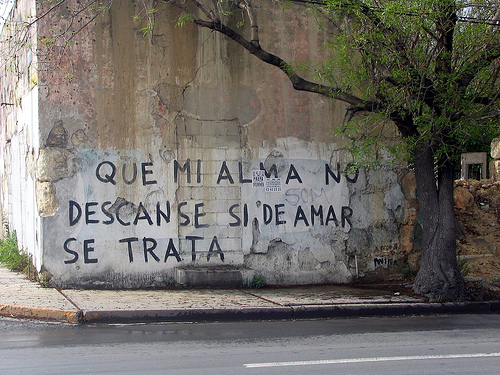No, it’s not really the last day of our acquaintance… but it is the last day of National Poetry Month. And there’s one final topic to take up: poetry in your everyday life.
Does the title of this post sound familiar? If you’re old enough, or a pop music connoisseur, you might recognize it as the first line of a song by Sinead O’Connor. Song lyrics often work themselves into our heads and stay there, attached to tunes, for reasons we can’t always identify. That very common experience is maybe the best example of how poetry makes its way inside.
 There are others, of course: you might sing or recite religious poetry in a place of worship, entertain a child with a nursery rhyme, quote a funny limerick to amuse a friend, send a greeting card with a couplet, laugh out loud over a bit of advertising doggerel. Perhaps you compose odes to your toes in the shower; perhaps you uncover “found poetry” in street signs or book spines. Even if you don’t study poetry formally as a scholar or poet, chances are you bump into it—and sometimes seek it out.
There are others, of course: you might sing or recite religious poetry in a place of worship, entertain a child with a nursery rhyme, quote a funny limerick to amuse a friend, send a greeting card with a couplet, laugh out loud over a bit of advertising doggerel. Perhaps you compose odes to your toes in the shower; perhaps you uncover “found poetry” in street signs or book spines. Even if you don’t study poetry formally as a scholar or poet, chances are you bump into it—and sometimes seek it out.
Online resources in the Sheridan Libraries can help you find that particular sonnet whose author you’ve forgotten, or relax with some casual verse surfing. Keep reading after the break to learn more.
• Enormous collections of literary works, plus reference and critical materials, are aggregated in Literature Resource Center, LitFinder and Literature Online (LiOn). Some of these incorporate more specialized collections that you can search independently, like Twentieth-Century African American Poetry.
• More focused collections allow for plenty of exploring within certain categories, like British Literary Manuscripts Online, Past Masters and Women Writers Online.
• E-books hook you up to specific texts, like the works of a single author or an anthology. There’s much to discover in NetLibrary, for example.
• You can keep up with poetic goings-on through our subscription to NewsBank’s Poetry Around the World.
There’s also lots of free poetry in the virtual world. Hopkins’ very own Roman de la Rose archive contains over 100 digital surrogates of manuscripts bearing this famous French medieval poem, many of them illuminated. Similar archival projects, where poems and illustrations interact, are The Rossetti Archive and The William Blake Archive.
Online poetry is increasingly a multi-media experience, whether you want to watch an uncanny poetry animation or hear a familiar voice read a poem out loud. The electronic environment has inspired new forms—sometimes called digital poetry or e-poetry—like Billy Collins’ action poetry and the many varieties collected in Bits of Poetry. But even experimental forms have a history, which you can explore at Ubuweb.
Of course, if you prefer poetry in person, check out the next national poetry slam—or course offerings in the Writing Seminars. April may be over but the poems are not…
